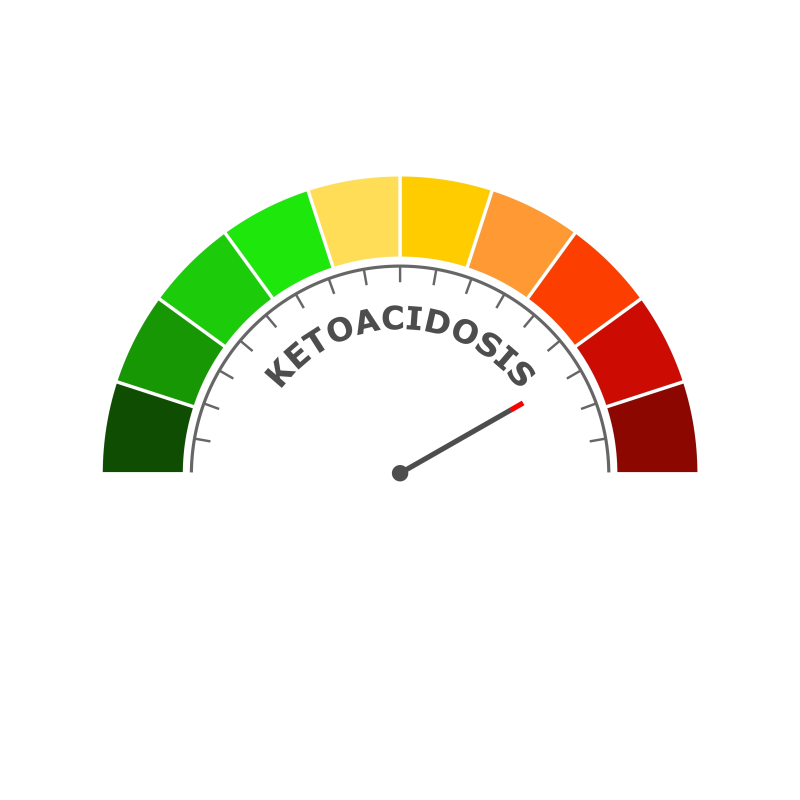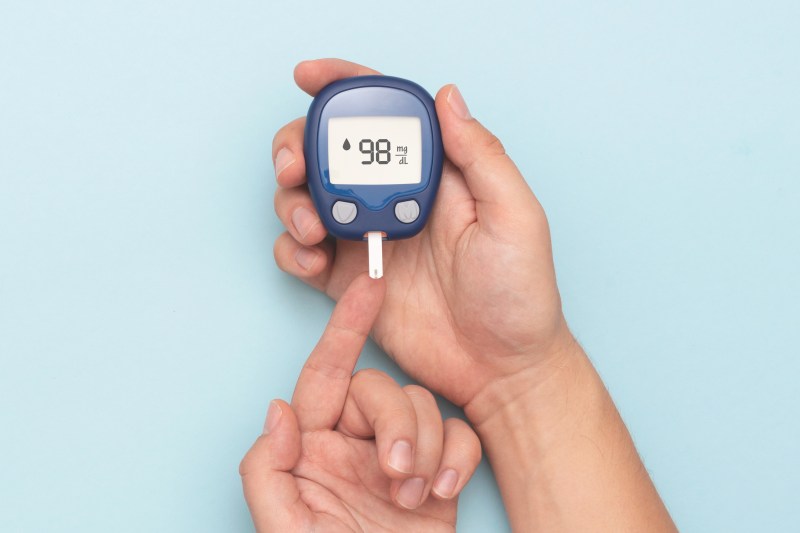At a glance
While ketosis and ketoacidosis may sound similar, they’re very different metabolic states. Nutritional ketosis is a controlled and beneficial process in which the body burns fat to generate energy. In contrast, ketoacidosis is a serious medical condition linked to dangerously high blood ketone levels and is primarily seen in individuals with poorly controlled diabetes.
Ketosis vs. ketoacidosis–what’s the difference? Ketosis is a natural metabolic state that promotes fat burning and occurs when the body doesn’t receive enough dietary carbohydrates to generate energy.
Though it sounds similar, ketoacidosis is a potentially life-threatening complication of diabetes characterized by dangerously high blood acid concentrations.
Discover the differences between ketosis and ketoacidosis and learn how to monitor ketone levels to stay within a safe range.
Ketosis vs. Ketoacidosis
Though often used interchangeably, ketosis and ketoacidosis are profoundly different conditions.
Ketosis can benefit health and is induced by fasting or a low-carb diet. Contrarily, ketoacidosis is a severe metabolic imbalance affecting primarily type 1 diabetics that can lead to high blood sugar levels, coma, and even death.
Let’s take a look at the differences between ketosis and ketoacidosis.
What is ketosis?
Ketosis, or nutritional ketosis, is a metabolic state of fat-burning in which the body breaks down dietary or stored body fat to generate energy instead of using sugar as a fuel source.
This process typically occurs during prolonged fasting or when carbohydrate intake is limited to no more than 50 grams daily, which can be achieved by following a ketogenic diet.
Within a few days of lowering carbohydrate intake, glycogen, a storage form of glucose, is depleted. As a result, the liver starts to burn fats and releases large amounts of ketone bodies, which are natural acids that circulate in the bloodstream and supply energy to cells.
Ketosis may cause temporary side effects, widely known as the keto-flu, when first starting a ketogenic diet.
Signs of ketosis include symptoms such as:
- Nausea
- Dizziness
- Fatigue
- Headaches
- Constipation
- Diarrhea
- Bad breath
- Rashes
- Insomnia
- Brain fog
- Carb and sugar cravings
- Irritability
Not everyone will experience adverse effects after starting a high-fat diet. However, in those affected, keto-flu symptoms are typically mild and tend to dissipate within a few days once the body adapts to using ketones as a primary fuel source.

What is ketoacidosis?
Ketoacidosis, also known as adult diabetic ketoacidosis, is a potentially life-threatening complication of diabetes that occurs as a result of insufficient insulin levels.
Ketoacidosis is most common in individuals with type 1 diabetes and is typically caused by missed insulin doses, insulin pump failure, or incorrectly calculated insulin requirements.
Though rare, type 2 diabetics are also at risk of ketoacidosis if their bodies don’t produce enough insulin or if they skip an insulin dose.
Lack of adequate insulin causes dangerously high blood sugar levels, and at the same time, triggers the rapid breakdown of fat. This releases excessive amounts of ketone acids into the bloodstream, leading to changes in blood pH levels and ketoacidosis.
“Excessive ketone concentrations alter the blood’s pH levels, which can impair crucial physiological functions, including heartbeat regulation, nerve impulse transmission, and energy-making processes,” explains Dr. Berg.
Signs of ketoacidosis often develop quickly and often include:
- Abdominal pain
- Dry mouth
- Difficulty breathing
- Extreme thirst
- Confusion
- Exhaustion
- Frequent urination
- High blood glucose levels
- Fruity-smelling breath
- Fainting
Unlike ketosis, ketoacidosis progressively worsens and requires prompt medical treatment, usually within 24 hours of symptom onset.
Ketoacidosis can also be triggered by infections, diseases, and various substances, including urinary tract infections (UTIs), heart attacks, alcohol, and certain drugs.
Watch the video below to learn more about the difference between ketosis and ketoacidosis.
4 benefits of ketosis
For over a century, ketogenic diets have been used to manage and alleviate epilepsy. In recent years, low-carb diets have also gained recognition for supporting various metabolic, cognitive, and immune functions.
Here are four incredible benefits of ketosis.
1. Supports weight loss
Dietary carbohydrates are converted into blood sugar, providing energy to cells and tissues. However, blood sugar that’s not immediately used is stored as fat, which explains why high-carb diets are the leading causes of weight gain and obesity.
Restricting dietary carbohydrates pushes the body to burn fat as a primary fuel source, which accelerates fat loss and reduces overall body fat.
This shift to fat burning helps deplete stored fat reserves and contributes to weight loss, as the body utilizes its fat stores to meet energy needs.
2. Improves insulin sensitivity
Insulin is a crucial metabolic hormone that facilitates the cellular update of blood sugar. However, chronically elevated insulin levels, typically linked to high-carb diets, can lead to insulin resistance.
Insulin resistance is characterized by cells that don’t respond to insulin and can’t effectively absorb blood sugar. This can lead to loss of glycemic control and diabetes and has been linked to cardiovascular disease, stroke, and inflammatory diseases.
Ketosis helps prevent blood sugar fluctuations and keeps insulin levels stable, which has been shown to improve cellular insulin sensitivity.
A study published in Nutrients found that “Besides weight loss, ketogenic diets produce direct insulin-sensitizing effects which are mostly due to the capacity of its restricted-digestible carbohydrates content to lower blood glucose and insulin levels.”1

3. Cardioprotective effects
Heart disease is the leading cause of death in the United States and is associated with several risk factors, including high blood pressure, obesity, diabetes, and imbalanced cholesterol.
A nutritious low-carb diet such as Healthy Keto® can help reduce the risk of cardiovascular disease by lowering low-density lipoprotein (LDL) cholesterol, widely known as bad cholesterol.
Keto also limits sugar and carbohydrate intake, which can help reduce chronic inflammation and improve insulin resistance. This, in turn, can alleviate arterial stiffness and lower high blood pressure, linked to better cardiovascular health.
4. Promotes cognitive health
Maintaining ketosis has been linked to a reduced risk of developing neurodegenerative disorders, including Alzheimer’s and Parkinson’s Disease.
Neurodegenerative diseases are typically characterized by impaired glucose metabolism within the central nervous system, the buildup of protein plaques, and neuronal cell death.
Research published in Nutrition found that ketone bodies have a neuroprotective effect on brain cells. It’s believed that ketones support cognitive function by providing an alternative energy source to glucose and helping reduce the accumulation of toxic protein aggregates.2

When ketosis is dangerous
Ketosis is safe when achieved with a nutritious ketogenic diet or through well-planned periodic fasting.
However, it’s possible to produce excess blood acids and enter ketoacidosis, which can quickly become dangerous.
According to research published in StatPearls, there are three types of ketoacidosis:3
- Starvation ketoacidosis (SKA)
- Alcoholic ketoacidosis (AKA)
- Diabetic ketoacidosis (DKA)
SKA occurs when the body is deprived of glucose for an extended period, such as from starvation or eating disorders like anorexia. In response, the body breaks down fat and muscle for energy, leading to the production of large amounts of high ketones that accumulate in the blood.
AKA is a metabolic complication diagnosed in those who abuse alcohol. These patients are often malnourished from chronic heavy drinking, which can trigger overt ketone production and ketoacidosis.
DKA is a potentially life-threatening condition that results from insufficient insulin levels, primarily seen in type 1 diabetics.

How to test your ketone levels
A blood test or urine test can be a valuable tool for evaluating ketone concentrations in the body.
Urine tests can be purchased over the counter and performed at home. However, blood ketone tests are more accurate, though they’re invasive and require a doctor’s visit.
Urine ketone levels less than 0.6 millimoles per liter (mmol/L) fall within the normal range, while those following a ketogenic diet may see levels between 0.6 and 3 (mmol/L).
Ketoacidosis is typically diagnosed when urinary ketone concentrations rise to between 3 and 9 mmol/L, and a concentration greater than 10 mmol/L requires immediate medical attention.
Blood ketone levels below 0.6 mmol/L are considered normal, while those on a ketogenic diet typically have levels between 0.6 and 1.5 mmol/L.
Blood ketone concentrations between 1.5 and 3 mmol/L suggest an increased risk of ketoacidosis, and levels above 3 mmol/L indicate severe ketoacidosis.
If you’re diabetic and worried about ketoacidosis, it’s crucial to monitor your blood sugar and ketone levels regularly and consider following a nutritious ketogenic diet such as Healthy Keto.
Limiting carbohydrates can help reduce the risk of ketoacidosis, but it’s important to consult your healthcare provider first, as you may need to adjust your insulin dosage accordingly.
Key takeaways
- Nutritional ketosis is a beneficial metabolic state that supports fat burning, weight loss, and improved insulin sensitivity.
- Ketoacidosis is a life-threatening diabetic complication caused by excessive ketone buildup and high blood acidity.
- Ketosis can be triggered and maintained with controlled carbohydrate intake, while ketoacidosis is typically caused by insulin deficiency.
- Common signs of ketoacidosis include extreme thirst, confusion, fatigue, and fruity-smelling breath, signalling the need for immediate medical attention.
- Monitoring blood sugar and ketone levels helps ensure metabolic health and reduces the risk of complications associated with diabetes.
FAQ
1. When does ketosis become ketoacidosis?
Ketosis can become ketoacidosis when the body produces excessive ketones, leading to dangerously high blood acid levels. This condition typically arises due to severe insulin deficiency or uncontrolled diabetes, causing a significant imbalance in blood chemistry.
Nutritional ketosis doesn’t usually lead to ketoacidosis because it’s managed by a controlled intake of carbohydrates and adequate insulin levels.
2. How do I know if I’m in ketoacidosis?
A blood or urine test can determine if you’re in ketoacidosis. Urine ketone levels above 10 mmol/L and blood ketone concentrations greater than 3 mmol/L indicate ketoacidosis.
Common symptoms of ketoacidosis include excessive thirst, dry mouth, difficulty breathing, frequent urination, and exhaustion. If your urine and blood ketone levels are indicating ketoacidosis or you’re experiencing symptoms, seek medical attention immediately.
3. How long is it safe to be in ketosis?
It’s generally safe to be in ketosis for extended periods, provided you are following a well-balanced ketogenic diet and monitoring your health regularly.
4. What is the difference between starvation, ketosis, and ketoacidosis?
Starvation occurs when the body is in a prolonged fasting state and starts to break down muscle tissue after depleting its fat stores. In contrast, ketosis is a natural metabolic state where the body uses fat for energy instead of glucose, typically induced by restricting dietary carbohydrates.
Ketoacidosis is a life-threatening diabetic complication that results from excessive ketone production and high blood acid levels, often due to severe insulin deficiency or uncontrolled diabetes.
5. Is ketoacidosis deadly?
Yes, ketoacidosis can be life-threatening. Though diabetic ketoacidosis results in death in approximately two percent of cases, it can lead to diabetic coma and other serious complications, such as dehydration and respiratory issues, that require immediate medical attention.
Sources
- https://www.ncbi.nlm.nih.gov/pmc/articles/PMC10385501/ ?
- https://www.sciencedirect.com/science/article/abs/pii/S0899900718302764 ?
- https://www.ncbi.nlm.nih.gov/books/NBK534848/ ?


















